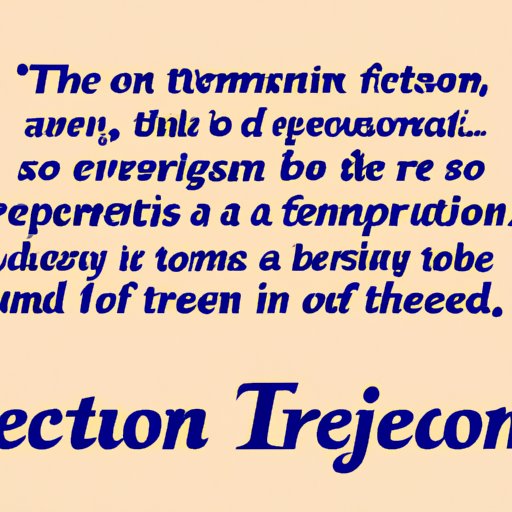Introduction
Thomas Jefferson is widely regarded as one of the founding fathers of the United States. He was a major contributor to the Declaration of Independence, which he wrote in 1776. This document has become one of the most iconic documents in American history, and it has served as the foundation for the nation’s political system and values ever since. In this article, we will explore how Thomas Jefferson justified writing the Declaration of Independence.
Exploring Thomas Jefferson’s Philosophical Influence on the Declaration of Independence
Thomas Jefferson was born in 1743 and was educated at the College of William & Mary. He studied law and philosophy, and was deeply influenced by the works of John Locke, whose writings on government and natural rights had a profound impact on Jefferson’s own beliefs and ideas. His understanding of these principles helped shape the Declaration of Independence and its message of natural rights and freedoms.
Examining Thomas Jefferson’s Motivations for Writing the Declaration of Independence
At the time the Declaration of Independence was written, the American colonies were in the midst of a struggle for independence from Britain. The colonists had long been subject to taxation without representation, and they were fed up with being denied basic rights and freedoms. These grievances were outlined in the Declaration of Independence, and they provided the impetus for Jefferson to write the document.
The political climate of the time was also a factor in Jefferson’s decision to write the Declaration of Independence. In the years leading up to the signing of the document, the American colonies had become increasingly frustrated with the British government’s refusal to acknowledge their rights. This tension created an atmosphere where the Declaration of Independence was seen as a necessary step toward achieving freedom from British rule.
Finally, it is important to note that Thomas Jefferson had personal motivations for writing the Declaration of Independence. His commitment to democracy and natural rights was apparent in his writings, and he believed that the American colonies had the right to govern themselves and be free from oppressive rule.
Analyzing Thomas Jefferson’s Use of Rhetoric in the Declaration of Independence
Thomas Jefferson was known for his skillful use of language, and this is evident in the Declaration of Independence. He used powerful words and phrases to convey his message of freedom and liberty, and he crafted the document in a manner that was both persuasive and inspiring. He also made use of pathos, or emotional appeal, to evoke powerful feelings among the readers.
Investigating Thomas Jefferson’s Political Ideology and Its Impact on the Declaration of Independence
Thomas Jefferson was an advocate of democracy, and he believed in the power of the people to govern themselves. He was also a strong proponent of natural rights and freedoms, and he viewed these rights as fundamental to any just society. These beliefs are reflected in the Declaration of Independence, which outlines the grievances of the American colonies and calls for the establishment of a new nation based on the principles of democracy and human rights.
Understanding Thomas Jefferson’s Justification for Writing the Declaration of Independence
Thomas Jefferson believed that the American colonies had the right to revolt against their oppressors, and he viewed the Declaration of Independence as a way to proclaim this right to the world. He also saw the document as an opportunity to create a better future for the United States. He envisioned a nation in which people could live freely and pursue their own paths without fear of oppression or tyranny.
Conclusion
Thomas Jefferson was a key figure in the development of the Declaration of Independence, and he provided several justifications for writing the document. He was heavily influenced by his studies of philosophy, and he was motivated by the grievances of the American colonies and his own belief in natural rights and democracy. His use of rhetoric and powerful language helped make the document both persuasive and inspiring, and his vision of a brighter future for the United States still resonates today.
(Note: Is this article not meeting your expectations? Do you have knowledge or insights to share? Unlock new opportunities and expand your reach by joining our authors team. Click Registration to join us and share your expertise with our readers.)
